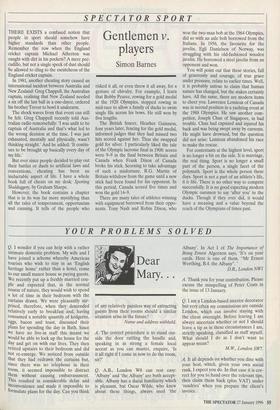SPECTATOR SPORT
Gentlemen v.
players
Simon Barnes
THERE EXISTS a confused notion that people in sport should somehow have higher standards than other people. Remember the row when the England cricket captain Michael Atherton was caught with dirt in his pockets? ,A mere pec- cadillo, but not a single speck of dust should be allowed to cling to the escutcheon of the England cricket captain.
In 1981, another cheating story caused an international incident between Australia and New Zealand: Greg Chappell, the Australian captain, realising that New Zealand needed a six off the last ball in a one-dayer, ordered his brother Trevor to bowl it underarm.
The shock waves from that event can still be felt. Greg Chappell recently told Aus- tralian radio remorsefully: 'I was unfit to be captain of Australia and that's what led to the wrong decision at the time. I was just exhausted, mentally and physically, wasn't thinking straight.' And he added: 'It contin- ues to be brought up basically every day of my life.'
But ever since people decided to play out their battles or duels to artificial laws and conventions, cheating has been an ineluctable aspect of life. I have a whole book full of cheats on my desk: Sporting Skulduggery, by Graham Sharpe.
However, the book contains a chapter that is in its way far more mystifying than all the tales of temperament, opportunism and cunning. It tells of the people who risked it all, or even threw it all away, for a gesture of chivalry. For example, I learn that Bobby Pearce, rowing for a gold medal at the 1928 Olympics, stopped rowing in mid-race to allow a family of ducks to swim single file across his bows. He still won by five lengths.
The British fencer, Heather Guinness, four years later, fencing for the gold medal, informed judges that they had missed two hits scored against her. Thus she swapped gold for silver. I particularly liked the tale of the Olympic lacrosse final in 1908: scores were 9-9 in the final between Britain and Canada when Frank Dixon of Canada broke his stick. Scorning to take advantage of such a misfortune, R.G. Martin of Britain withdrew from the game until a new stick had been found for his opponent. In this period, Canada scored five times and won the gold 14-9.
There are many tales of athletes winning with equipment borrowed from their oppo- nents. Tony Nash and Robin Dixon, who won the two-man bob at the 1964 Olympics, did so with an axle bolt borrowed from the Italians. In 1956, the favourite for the javelin, Egli Danielsen of Norway, was struggling with his old-fashioned wooden javelin. He borrowed a steel javelin from an opponent and won.
You will point out that these stories, full of generosity and courage, of true grace under pressure, relate to earlier times. Well, it is probably untrue to claim that human nature has changed, but the stakes certainly have. All the same, there are modern items to cheer you. Lawrence Lemieux of Canada was in second position in a yachting event at the 1988 Olympics. He saw another com- petitor, Joseph Chan of Singapore, in bad trouble. Chan had capsized and injured his back and was being swept away by currents. He might have drowned, but the question did not arise: Lemieux abandoned his race to make the rescue.
For contestants at the highest level, sport is no longer a bit on the side. It is marriage, the real thing. Sport is no longer a small part of the person, a single facet of the polymath. Sport is the whole person these days. Sport is not a part of an athlete's life, it is life. There is no other way to compete successfully. It is no good expecting modern Olympic oarsmen to say 'after you' to the ducks. Though if they ever did, it would have a meaning and a value beyond the reach of the Olympians of times past.


























































 Previous page
Previous page